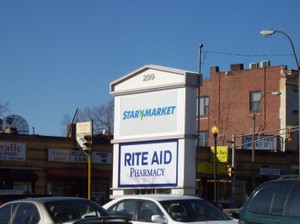 A judge has ruled in the City of Somerville’s favor in a lawsuit filed by the owner of the former Star Market in Winter Hill, who contested denials of a building permit and two special permits and the legality of the City’s Zoning Ordinance. The judge entered a summary judgment dismissing all of the plaintiff’s claims.
A judge has ruled in the City of Somerville’s favor in a lawsuit filed by the owner of the former Star Market in Winter Hill, who contested denials of a building permit and two special permits and the legality of the City’s Zoning Ordinance. The judge entered a summary judgment dismissing all of the plaintiff’s claims.
The ruling upholds the zoning amendments that went into effect on Feb. 10, 2010, that created two new Commercial Corridor Districts along Broadway, including at the intersection of Broadway and Temple Street, established with the goal of promoting more neighborhood-serving retail in mixed-use buildings, bringing to Winter Hill the same vibrancy and long-term planning strategy that has revitalized other Somerville neighborhoods with an eye toward walkability.
Comar Real Estate Trust had its building permit for 299 Broadway denied on Feb. 22, 2010, because the building is within one of those Commercial Corridor Districts, and converting the former supermarket to an Ocean State Job Lots store would require two special permits under the city’s Zoning Ordinance.
In a written decision dated Sept. 2, 2010, the Somerville Planning Board denied Comar Real Estate Trust’s application for those two special permits because the proposed use was not consistent with the stated purpose of the Zoning Ordinance and Commercial Corridor Districts. Comar Real Estate Trust then filed its complaint in Land Court on Sept. 28, 2010.
The Middlesex Land Court decision dated Sept. 5, 2013, signed by Associate Justice Judith C. Cutler, rejected the plaintiff’s arguments that the proposed use of the building meets the special permit requirements or that the Zoning Ordinance violates state and U.S. constitutional law.
In doing so, the court upheld the community-driven vision for Winter Hill that would bring more walkable retail to the neighborhood that serves residents’ immediate needs and decreases reliance on driving for those daily needs, while increasing available housing in the neighborhood through multi-tenant, mixed-use buildings—the same successful formula that has created active neighborhood squares throughout the city.
“With this impasse now concluded, the City looks forward to working with Comar Real Estate Trust and neighbors in Winter Hill in realizing the community’s vision of a vibrant, mixed-use neighborhood,” said Mayor Joseph A. Curtatone. “Change is not always easy, but I know that by doing the hard work, meticulous planning and long-term visioning, we can create an environment that benefits both businesses and residents, preserving what we love about Somerville while making our neighborhood more walkable and livable. Like the ongoing transformation on lower Broadway in neighboring East Somerville, we are looking to build community in Winter Hill, and are excited to work with Comar Real Estate Trust and the community to continue creating a resilient and self-sufficient economic base for Winter Hill and our city.”
“Developments that create both multiple storefronts and additional housing are integral to reviving Broadway while keeping the diversity and character of Ward 4 intact,” said Ward 4 Alderman Tony Lafuente. “Ward 4 residents would get an array of retailers to meet their daily needs within walking distance of their homes, and tax burden relief from the expansion of commercial square footage. Our long-time Winter Hill businesses that we cherish would also benefit from a refreshing change in the business climate. I am relieved that this issue has been resolved, that the Land Court decision backs Ward 4 residents’ vision for their community, and know that the City can work with Comar Real Estate Trust in finding a solution that works for all.”
The Land Court Decision is docket number 10 MISC 440303. The plaintiffs were Comar Real Estate Trust by James A. Cohen, and James B. Marcus, Co-Trustees. The defendants were the City of Somerville, the Somerville Planning Board, and members of the Planning Board that issued the written decision in Sept. 2010 denying the special permit applications.















Reader Comments